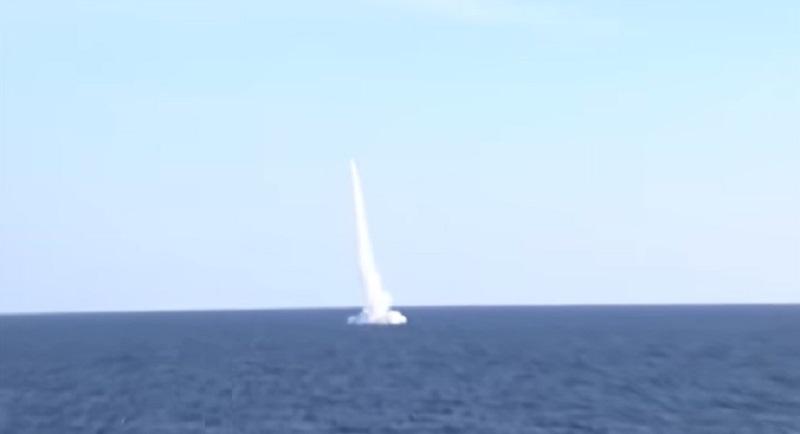The Russian Pacific Fleet’s latest Kilo-class diesel-electric submarine Volkhov launched a Kalibr cruise missile from the submerged position in the Sea of Japan against a ground target. The missile struck the coastal target at the Syurkum tactical ground in the Khabarovsk Region at the designated time. The missile was launched to a distance of over 1,000 km. Before accomplishing the combat exercise, the submariners stealthily deployed to the designated area. Ships and vessels of the Russian Pacific Fleet, aircraft and drones of the Pacific Fleet’s naval aviation provided support for the missile firing.
The 3M-54 Kalibr also referred to it as 3M54-1 Kalibr, 3M14 Biryuza (turquoise), (NATO codenames SS-N-27 Sizzler and SS-N-30A), 91R1, 91RT2 is a group of Russian surface ship-, submarine-launched and airborne anti-ship and coastal anti ship (AShM), land attack cruise missiles (LACM) and anti-submarine missiles developed by the Novator Design Bureau (OKB-8). Domestic variants are basic versions of this missile family; these are the 3M54 and 3M14. The export model is called Club. The 3M54K Kalibr is a submarine-launched anti-shipping variant deployed by the Russian Navy. Its length is 8.22 m (27.0 ft), with a 200 kg (440 lb) warhead. Its range is 375–500 km (233–311 mi).

The Volkhov is the second of six Kilo-class submarines built for the Pacific fleet. Project 636.3 submarines (Kilo-class) are the third generation of diesel-electric submarines which are the most noiseless in the world. These attack submarines are mainly intended for anti-shipping and anti-submarine operations in relatively shallow waters. They develop an underwater speed of 18 knots, submerge to 300 meters and have a cruising capacity of 45 days. It was laid in July 2017 and floated in December 2019. The construction of the series goes on schedule and is to be completed in 2022.
The Kilo class, Soviet designation Project 877 Paltus (meaning “halibut”), NATO reporting name Kilo, is a class of diesel-electric attack submarines designed and built in the Soviet Union for the Soviet Navy. The class was built until the mid-1990s, when production was switched to the more advanced Project 636 Varshavyanka (meaning “Varsovian (inhabitant of Warsaw; feminine)”) variant, also known as Improved Kilo-class in the West. Six Project 636.3, an improved version of the Kilo-class, have been built for the Black Sea Fleet and further boats are being built for the Pacific and Baltic Fleets.
















